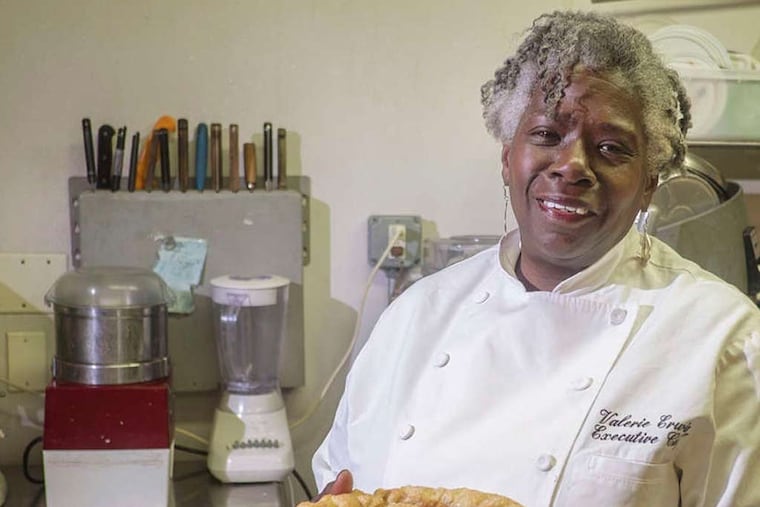A Geechee Girl goodbye
Two Saturdays ago on a stretch of Germantown Avenue they cleared the chairs out of Geechee Girl, the homey "rice cafe" that since 2003 had been cooking up the coastal South's Low-Country shrimp and stone-ground grits, tomatoey red rice, and a crispy-fried version of Hoppin' John, the rustic pilaf informed by bacon and black-eyed peas and, now and then, John's little sister, Limpin' Susan, in which the peas are replaced by thin-sliced okra.

Two Saturdays ago on a stretch of Germantown Avenue they cleared the chairs out of Geechee Girl, the homey "rice cafe" that since 2003 had been cooking up the coastal South's Low-Country shrimp and stone-ground grits, tomatoey red rice, and a crispy-fried version of Hoppin' John, the rustic pilaf informed by bacon and black-eyed peas and, now and then, John's little sister, Limpin' Susan, in which the peas are replaced by thin-sliced okra.
Most of the tables went out, too. The crowd that night was going to overflow the house. Old Mount Airy friends and kitchen pals of chef-owner Valerie Erwin were coming to bid farewell (sometimes tearfully) to her singular place.
Geechee was a personal, heartfelt, family-centered project, less a for-profit business, it could often seem, than a culinary tutorial, and homage to the daily rice cookery of her foremothers in old Savannah and Charleston, and to her own mother and father, later, who brought up her and her sisters on North Philadelphia's Arizona Street.
Longtime regulars would be on hand. And Philadelphia's early wave of pioneering female restaurateurs: the White Dog's irrepressible Judy Wicks in red cowgirl boots; chef and cookbook author Aliza Green; and the Striped Bass' cover girl opening chef Alison Barshak, in town from Atlanta.
Steve Poses, Frog-Commissary founder and the godfather of the Philadelphia restaurant renaissance, would arrive resplendent in a royal-blue sweater vest and stay until the bittersweet end.
There would be a troubled teen Erwin had taken under her wing and given a serving job that, the now-young woman testified, changed her life; there would be a video tribute from John T. Edge of the Southern Foodways Alliance; and a delegate sent by South Carolina's estimable Anson Mills, the purveyor of fine grits and cornmeals and Carolina Gold, the prized heritage rice: Erwin was for five years its only account in Philadelphia.
It was going to be - and as Bulleit Bourbon cocktails flowed, it eventually was - a standing room only affair. Oh, let's just say it: a love fest. And this particular evening at Geechee Girl (which closed on Dec. 31 after a 12-year run), Erwin's fan club was turning the tables - doing the cooking for her: Feast Your Eyes, the caterer, chipped in with pulled pork; CooperMarket, smothered chicken; Royer Smith, former chef for La Salle University, a mess of shrimp and grits.
The sour-cream pound cake was compliments of Jill Horn, who once ran a prepared-food stand in the Reading Terminal Market.
Erwin was a Princeton grad. Majored in politics. But she was hooked on the hospitality business early on. In her days in the trenches, Erwin, now 62, her signature dreadlocks going gray, worked with - or for - many of those packing the room (at a total nearing 100, double the seating capacity). She cooked at La Terrasse ("I had a reputation for a good palate"), turned out omelets at the Commissary, worked at Rollers in Chestnut Hill, prepped at Striped Bass, helped Beth Cooper of Bala Cynwyd's CooperMarket, was a corporate chef for a while at a division of a French-owned conglomerate.
Glenn Bergman, the general manager of Weaver's Way Co-op (whose urban-farmed summer tomatoes Erwin touted on Facebook), was still emotional days later: "It was like that scene at the end of It's a Wonderful Life," he said, "where at the end of the film everyone's there whom [Jimmy Stewart] touched."
The end of Geechee Girl itself - named that by her sister Aleathia for the descendants of enslaved Africans who reestablished their rice cookery in the coastal Carolinas near the Ogeechee River - was not a total surprise. The cafe had moved from smaller digs in Germantown to the larger spot in Mount Airy. But it was clearly struggling. Some nights it was understaffed. Some nights customers fretted about long waits. Finances were touch-and-go: "It was like we were on the knife's edge," Erwin said.
The unkindest cut was delivered by last winter's unrelenting, business-killing snows. That was, as they say down South, all she wrote. Geechee was no longer limping. It was terminal. (Proceeds from the Geechee Gala, Jan. 10, will go to help Erwin get back on her financial feet.)
Chef-driven cafés have high mortality rates. And many, frankly, aren't around long enough to leave a legacy. But 12 years is a more than credible run. And Erwin's Geechee Girl was a special breed - ambitious, but down-home; based on one family's experience, but referencing the broader story of the African diaspora. At a glance it was all about rice and cake. But look longer, and it was one woman's statement about a people's continuity and the importance of community; about the still-unmet promise of social justice and the satisfaction, finally, of filling tables and filling bellies.
"I'd return to Geechee just for a plate" of that fried Hoppin' John, Inquirer food critic Craig LaBan wrote in a fond 2011 review, "those grains of jasmine rice all toasty crunch, studded with toothy beans and smoky nuggets of chewy bacon."
It's a pity he won't - and we won't - get that chance again.
It's a privilege we got it at all.